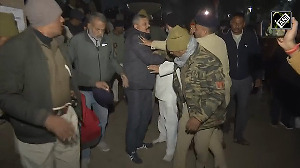When I read yet another report about a farmer who commits suicide, I sit transfixed trying to imagine the depths of despair a man must sink to before he decides to kill himself and abandon his family to the mercy of a world that he himself could not face.
Was it an act of irresponsibility? Was he a wastrel? Or has the crisis in Indian agriculture become so deep that many farmers have reached a dead end? Or, as many newspaper reports seem to imply, are moneylenders in rural India snaring innocent farmers to pledge their bullocks and land on such usurious terms that the farmer has no choice but to abandon these, the only assets he has, and take his own life to escape the shame?
I have been walking around with such questions rattling in my head, till, the other day, browsing at a bookshop in Bangalore, when my eyes lit on the title, Undeserved Death: A Study on Suicide of Farmers in Andhra Pradesh, 2000-2005, I leapt to get it. It reports the findings of a study done during 2004 and 2005 by the Council of Social Development.
One case in it, that of Kommalu, a 48-year-old farmer from Warangal district, is an illustrative one. In the 90s, Kommalu separates himself from his already small joint family farm and sets out to make a living on his own 3 acres. He grows paddy on 2.5 acres and vegetables on the rest.
In normal times, the village tank, filled by rain water, serves him well for two crops a year. At a pinch he buys water at nominal rates from his neighbour's bore well. Kommalu could have continued leading this low-risk, subsistence-level life, if he had not turned ambitious.
Large farmers around Kommalu are raking in money growing cotton. Local dealers tempt him offering seeds, fertilisers and pesticides on easy credit to grow cotton. Kommalu decides, in 1992, to grow cotton on one acre of his three. The crop is good and he sells it to the same dealers.
Encouraged, he next grows cotton on all of his three acres. In five years, he is able to buy a motor bike, a TV and jewellery.
Fertiliser and seed prices are steadily rising and he realises that he needs to grow ever more cotton to make the same amount of money. He leases a neighbour's five acres and grows cotton on that. That year, despite pest attacks, he squeezes through, paying off half the credit from the fertiliser supplier.
When the time comes to pay the balance, he takes out a loan from a moneylender, mortgaging an acre of his land.
The years 1999-2001 saw drought in Warangal. Unfortunately, that is also when two of his daughters have to be married off. He is back to the moneylender, mortgaging his remaining two acres. By now, he has also fallen behind on lease payments, and his neighbour takes back the leased five acres.
Kommalu is back to growing cotton on his three acres for ever smaller returns except that these three acres are truly not his - they are mortgaged to the moneylender.
When his daughters get pregnant he is back to the moneylender. Now his two plough bullocks are mortgaged as well.
While interest payments mount, returns from cotton farming have become negligible. To make ends meet, he, his son and wife become agricultural labourers.
One evening, he walks over to the land that he once owned, stands watching the sun set, swallows pesticide and ends his life.
In spite of the precise, scholarly tone of the report, I could feel a lump in my throat.
This is not just Kommalu's story. It is a theme across the many suicide cases in this study: Indian farm sizes get smaller as joint families divide; the farmer attempts to get scale by leasing out land at high rates; a steadily depleting water table, a switch to single-crop cash crop from the mixed-crop farming of the past; the unpredictable and ever decreasing price of cash crops; ever increasing costs of seeds and fertilisers; increasing expenditure on weddings, education and health.
The American version of Kommalu's story is the basis of John Steinbeck's 1939 novel The Grapes of Wrath, the story of the Joad family whose farm is foreclosed by bankers in drought-ridden Oklahoma. We follow them as they struggle their way in their jalopy piled high with mattresses and pots and pans, through Texas, New Mexico, and Arizona and cross the Mojave Desert to get to the land of their dreams, California. They work as fruit pickers (or landless labourers, as we call them here in India).
Steinbeck's villains too are the financiers, the "Bank of the West" (a thinly veiled reference to Bank of America), which helps land barons gobble up small farms to concentrate them into a few large holdings. Just as we blame the banks, "the village moneylenders," for not lending enough to the farmer in trouble.
An unpaid loan is often a sign that the borrower's business just isn't making enough money. Making more credit available, while a kind-hearted gesture, does not solve that problem.
When the large retail chains get going, it's going to be a boon for farmers, but probably only farmers with hundreds of acres may be able to match the prices, quality and consistency needed.
The Joad family odyssey ends in California in the Santa Clara Valley, which in the 1930s was full of fruit farms. Today it is the home of Intel, Apple, Yahoo!, Google.
Is the moral of the Kommalu and the Joads stories this: the faster we make the transition from farm to industry, the shorter the pain?
Ajit Balakrishnan is the founder and chief executive officer, rediff.com.
Comments welcome at ajitb.rediffiland.com
ALSO READ:







 © 2025 Rediff.com -
© 2025 Rediff.com -